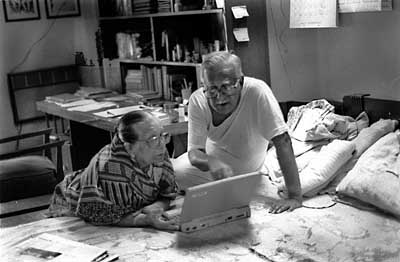Subscribe to ShahidulNews
by?rahnuma ahmed
?One thing led to another. It was not planned, nothing of that sort. It?s a long story, but first let me tell you what I think about motherhood.? We were chatting, Mohua Mohammod (pseudonym) and I. Mohua, in her early thirties, is a PhD student in the USA, currently in Dhaka for a short period of fieldwork.
?When I speak of biological motherhood, I don?t want to minimise pregnancy, or the exhaustion of bearing children, of giving birth. After all, women can die during labour. I guess, I speak from a position of, let?s put it this way, the politics of blood-relatedness, of family ties, things that are taken as given, that are seen in isolation from the politics of class and gender. Or, race and ethnicity. I am not saying that there?s anything wrong with having children of one?s own. What I am saying is that the social fabric is woven from these very relations. Whether you give birth, or you adopt, you cannot isolate these things from social inequalities. On the contrary, social relations ? of power and inequality ? are often reproduced through these everyday events. If you look at the new technologies of reproduction, like, say a test-tube baby, these technologies often reinforce notions of purity and pollution, cultural ideas of ?good? blood and ?bad? blood.
?Now, if you bring up the issue of adoption, someone or the other is likely to say dudher shad ghole mete na. I think this mindless repetition of ?milk? and ?whey? distracts our attention from the politics of the issue. Motherhood is social. For me, it is something collective, but of course, you know better than I do that we have moved away from our earlier histories, that in this age of individualism Bengali parents keep saying, ?my son?, ?my daughter?, both in real life, and in TV ads. Gone are the days of ?tomar bhaijee?, ?tomar bhabi?, but of course, this is not true of the subalterns, the majority of the people. It is increasingly so, for those who matter. ???
?Actually, what I find most depressing is the lack of debate about these things, both in the women?s movement, and in left circles. Leftists seem to think that nothing further needs to be said about marriage, family, and sexuality after Engels wrote his Origins.? ???
She gifted me a little daughter. ? ?
Mohua began talking about how she became a mother. We were busy with Jouno Nipiron Protirodh Moncho (Platform to Resist Sexual Oppression) in 1999, she said. ???
The inmates of Tanbajar brothel were evicted earlier that year, and we had invited them to speak in our discussion series. I met Lipi apa (pseudonym) that day. We talked, and I gave her my phone number. One night, it was eight-ish, she suddenly rang. The DB police, she said, had beaten her up. She was in Dhanmondi road 2. It was not far from where we lived, and I went to see her, along with a friend. We sat and drank tea at a tea stall, we chatted about police brutalities. I fell into the habit of dropping by to see how she was while returning home from office. ???
I met Tania through her. Maybe fifteen or sixteen years old, Tania was also very small in build. She was seven months pregnant. Soon after, Lipi apa suddenly rang me. Tania was nearly dying, a caesarean had to be performed, could I come to Dhaka Medical? I rushed over with a friend, Lipi apa told me that she had signed the forms, that she felt saving the mother?s life was more important than the child?s. Mohua suddenly paused and asked me, Did I ever tell you that Lipi apa?s father was a muktijoddha? I nodded my head. ???
Mohua went on, I was standing in the corridor, Lipi apa had gone off somewhere, the nurse came out of the OT, she stuck the baby in my outstretched arms. My heart almost stopped beating. ???
Tania had to get back to work to feed herself, and so, a few days later, we all accompanied her to the Mother Teresa mission in old Dhaka. She gave her baby up for adoption. He was healthy, very beautiful. The nuns were confident, they would have no problems in finding him a home, they said. Lipi apa and I returned from old Dhaka in the same rickshaw. We could not stop ourselves, the tears kept flowing. ???
I went off to Europe several months later, for a three month-long diploma programme. I returned to find her pregnant. I asked her, hey, what?s this, what?s happening? She said, apa, you cried such a lot, this baby is for you. ???
And that?s how Anarkoli entered my life. ??? ???
Raising Anarkoli ???
Lipi apa and I would raise Anarkoli together, that was the plan. We fought over what we wanted her to be, whether she would be sent to a madrassah, or a school. The next year I went abroad to do my Masters, and Lipi apa started coming more frequently to our house. In my absence, the quarrels took place between her and my mother, often enough over Anarkoli, and how best to raise her. But more often, over Lipi apa herself. My mother repeatedly tried to domesticate her. In her eyes, Lipi apa was very wild. ???
Mohua went on, actually, I had never sat and thought that I would enter into such a relationship. It just happened. ???
We decided that Anarkoli would live with Lipi apa, but that she belonged to both of us, we were both her mother. I named her. When I lived in Dhaka I had a good salary, and I supported them. When I went abroad, I sent money from my stipend, but once there was a gap of 7-8 months because of a rift with the friend who acted as a go-between. My mother helped out then, but it was not the same. I felt very guilty. ???
Of course, it is difficult, very difficult. We belong to very different classes, our lives are very different. I have my studies. I lead a very disciplined life. But Lipi apa has lived on the streets, ?one arm tucked beneath my head, the other, covering my eyes?. After Anarkoli was born, she moved into a rented room, moved from a life on the streets to a home-centred life, saddled with a daughter. This has made her angry, she tells me often, I gave up my life of freedom for you. Mohua smiles ruefully and says, two women parenting a child is not easy. When I lived in Dhaka and was supporting them, I became a father. And now that I am here, I am like a husband, one who has returned for holidays, who sends money from abroad. ???
Now that I am back, even though it?s for a short period, Anarkoli is my daughter more than ever. She is eight years old now, she was born on December 14, 2000. Mohua suddenly pauses and says, we gave Tania?s son away on March 6. I never forget that day. She slowly returns to the present, Anarkoli tells me that her mother is thinking of getting married. The landlady has told her, ?your mother is doing itish-pitish, she is being flirty with that Nuruddin fella.? And Lipi apa herself has told me, ?I have raised Anarkoli for the last seven years, the next seven are yours.? I don?t blame her, she has a life too. I have told Anarkoli, I will put you into a boarding school, I will finish my doctorate and return after three years, and then we will live together. ???
Anarkoli still calls me khala, but our relationship is so different now. When I return home, she opens the door and sticks to me like a shadow. She covers my face with kisses. I tease her, who do you love more, me or your mother? She has discovered this game, she counts from one to ten one, two, three, four, and whoever is the last to be pointed at, is her most loved. She has now learnt to begin counting so that I end up being number ten! ??? ???
My family history ???
Your idea of family is different from that of others, I say gently. Well, there was always tension at home between the desire for a nuclear family, and those not related to us by blood. I grew up listening to how my grandfather, my father?s father had raised a boy as his own, how this foundling son was the only one who was left a share of his estate. You see, my grandfather was worried that he might not receive anything after his death. Not only that, he married his daughter to this tokano boy. When the family property was divided after his death, there was some ill feeling because this son benefited more than the others, he got his own share, and also benefited through his wife who had inherited as a daughter. I grew up listening to these stories, also, our house was always full of people. Our own extended family plus the extended families of those who worked for us. They would visit, stay over. How does your mother feel about Lipi apa, I ask? I can?t think of any other middle class mother who would accept her presence as casually as she does. Yes, my mother is an amazing woman. She is not without faults, but she is tremendously compassionate. ???
And your friends? Mohua laughs, ?You haven?t married yet?? That?s what everyone says. It?s the same in the US. My American women friends talk of their boyfriends, their crises, and I can?t help but tell them, ?your lives seem so prescribed.? Similar to many lives here. It doesn?t attract me. ???
?But do you talk to them about your life? About your daughter? About shared mothering?? I ask. No, not really. I guess I feel silenced by their accounts of the normal lives that they lead. ???
I ask playfully, What if you meet someone, fall in love, want to get married? What will happen to Anarkoli? ???
Well, Mohua laughs and says, for me to fall in love, I think he would not only have to be intelligent and committed, he would have to be a practising kind of guy, not someone who talks big. I would expect him to have several Anarkolis of his own! So, no problem.?
First published in New Age on 23rd June 2008

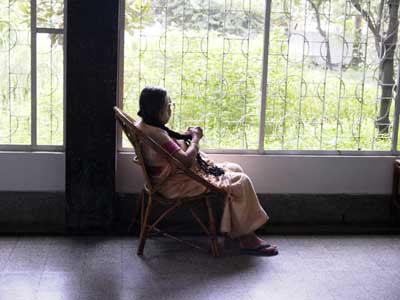
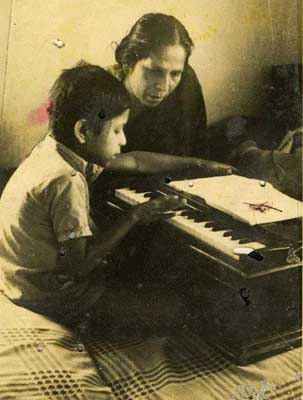
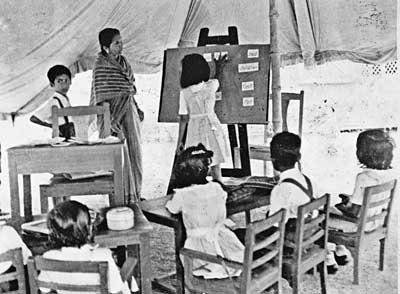
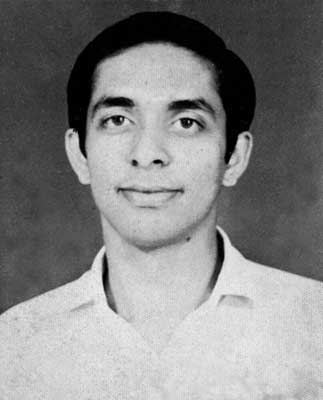
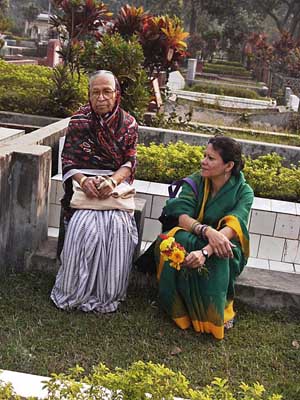
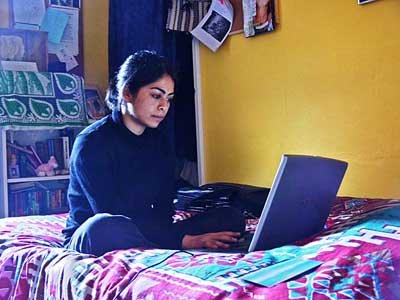
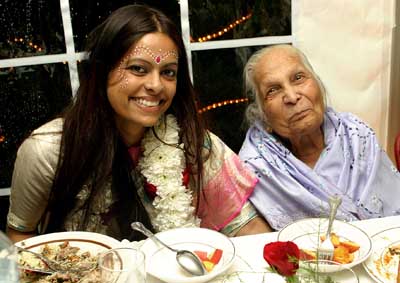 Amma at Sofia’s wedding
Amma at Sofia’s wedding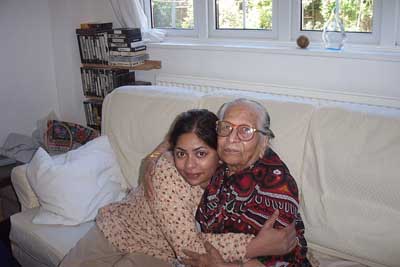
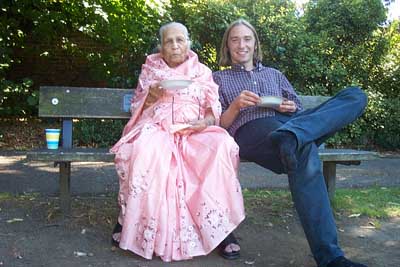 Amma and Sofia’s husband David
Amma and Sofia’s husband David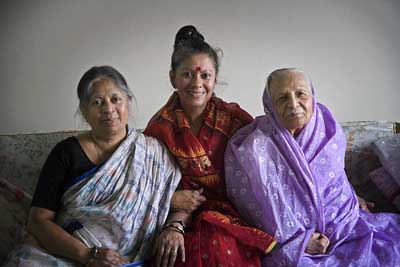
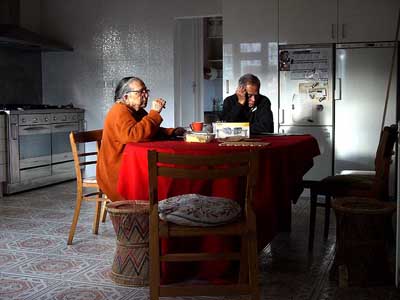 Amma and Dulabhai
Amma and Dulabhai